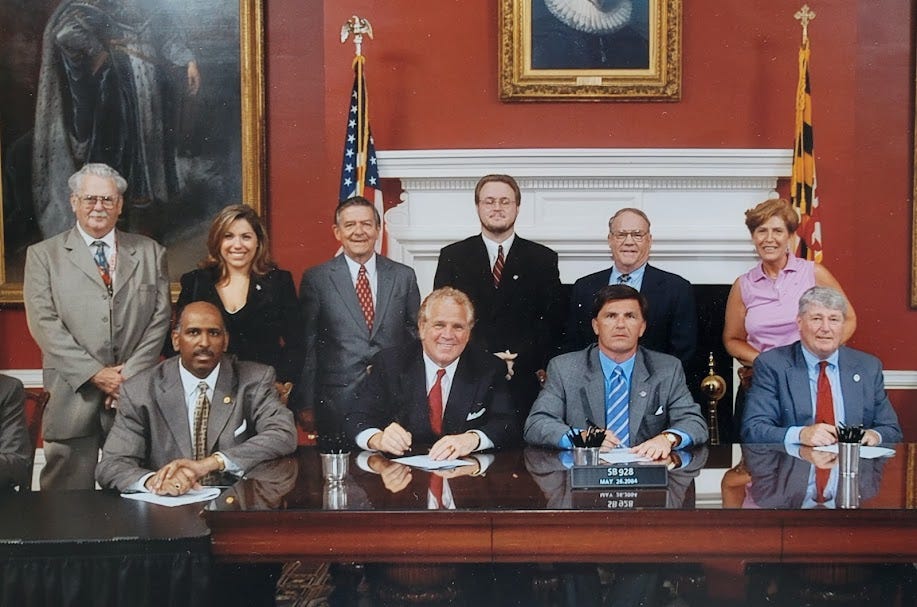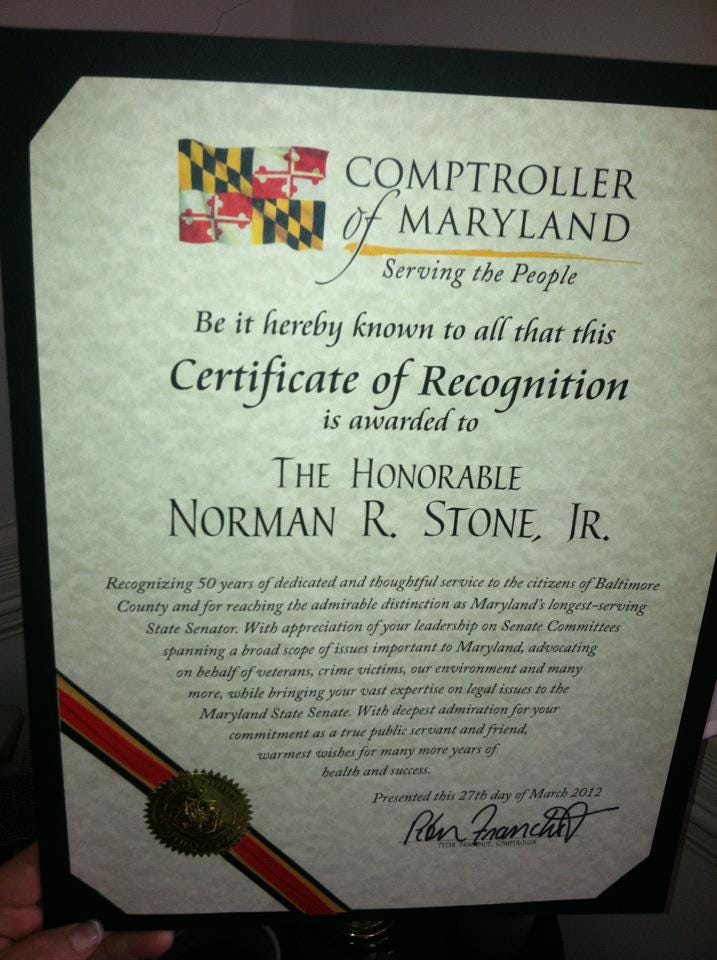Politics: Maryland State Senator Norm R. Stone, Jr.
NOTE: Media play an important role in reporting the list of the notable persons who died at the end of the year. In September, I wrote about NM Governor Bill Richardson. Today’s issue concerns my late legislative mentor, who died on June 16. Below was initially published in the Maryland Matters on November 28, 2019. I added seven photos and another article for your reading.
During the 2019 Annual Legislative Awareness Day earlier this fall, Kelby Brick, executive director of the Maryland Governor’s Office of the Deaf and Hard of Hearing, announced that I received its annual Civic Engagement award.
I could not accept this award because I was in Antalya, Turkey, where the USA Deaf Tennis Team participated in the Second World Deaf Tennis Championships. The weeklong tournament is sanctioned by the International Committee of Sports of the Deaf (ICSD).
But it immediately occurred to me that I could not have gotten this award without the assistance of former state Sen. Norman R. Stone Jr.
Angered by the Maryland Child Support Administration’s decision against my appeal based on a court decision, Drummond v. State, 714 A.2d 163 (1998), which dealt with child support and disability benefits, I tried to find a legislator who might be willing to sponsor a bill that would overturn provisions of the Drummond case during the 2002 and 2003 Maryland General Assembly legislative sessions.
During the 2004 session, I monitored the list of legislative bills daily until March 9 after learning that Stone had introduced SB 928 the previous day (the 55th day of the 90-day session).
I dialed his office, and his legislative assistant, JoAnne Gardiner Stone, answered. I asked her who or which organization persuaded the senator to introduce SB 928 – provisions of previous legislation. She replied, “A disabled Baltimore County policeman.”
One man!!!! I rushed to Annapolis and delivered to his Senate office my research – a list of 48 states that had allowed a non-custodial parent credit against his/her child support obligations for Social Security disability benefits paid on his/her behalf to his/her child(ren.) The two states that hadn’t were Maryland (Drummond) and New York (Graby v. Graby, 664 N.E.2d 488 (1996)).
On the Senate hearing day of March 25 (the 71st day of the 90-day session), I was introduced to that disabled policeman and the legendary Sen. Stone in his Senate office – with the assistance of an interpreter for the deaf due to my deafness. Stone said he needed our help to explain the legislation to the committee in a few hours.
After listening to the disabled policeman’s explanation, Stone told us that my research on the statutes of 48 states was beneficial. Then, all of us testified before the Senate Judicial Proceeding Committee.
On April 3 (the 80th day of the 90-day session), SB 928 was given a favorable report with amendments by the Judicial Proceedings Committee, and it passed the Senate 41-4. It was assigned to the House Judiciary Committee, was given a favorable report, and passed the House 123-18 on April 12 (the 89th day of the 90-day session).
However, Stone’s quick-tactic strategy prompted the Family & Juvenile Law Section of the Maryland State Bar Association to submit opposition to SB 928 to then-Gov. Robert Ehrlich Jr., so the governor’s office removed SB 928 from the April bill-signing day for more consideration.
After we lobbied Ehrlich’s office, the bill made it back on the list of legislation for a May signing day. The governor’s office told Stone that they could reserve a seat for him during the signing, but he turned them down.
On May 26, 2004, Gov. Ehrlich signed SB 928 into law (Chapter 491 of the Acts of 2004) with an Oct. 1 effective date. This action aligned Maryland with 48 other states on child support and disability benefits.

Two legislative sessions later, Sen. Stone introduced another one of my legislative proposals, SB 43, as a pre-filed bill on Jan. 11, 2006. This bill went through the legislative process unanimously, and Gov. Ehrlich signed it into law (Chapter 423 of the Acts of 2006). This action made the Maryland Child Support Administration become customer-friendly toward custodial and non-custodial parents.
Under the new law, the parent must notify the court of any change of address within 10 days after moving to a new address or any change of employment within 10 days after receiving the first earnings from the new employer. Notification to the court must be by certified mail, return receipt requested, or by filing in person at the court and getting proof of filing.
Under the old law, the parent had to send the address or employment change within 10 days to the court, the recipient, or, if a support enforcement agency receives support payments, the agency. Notification must have been by certified mail, and a return receipt was requested.
In the legislative session of 2009, Sen. Stone introduced my proposal, SB 97, which would have required that closed captioning for deaf or hard of hearing viewers be included in any campaign advertisement distributed by a campaign finance entity by broadcast or cable television or on its website. The Senate Committee on Education, Health, and Environmental Affairs took no action after the Jan. 29, 2009 hearing.
He re-introduced the same bill in 2010 as SB 102 and in 2011 as SB 22. Again, the committee did not act on the bills, but now, at least, a political candidate can send a political ad or web video to YouTube for closed captioning.
For the 2013 session, our proposal, SB 840, sailed smoothly, and then-Gov. Martin O’Malley signed it into law (Chapter 567 of the Acts of 2013). The bill requires that specimen ballots be mailed at least one week before the first day of any early voting period rather than at least one week before an election.
2014 was the last of Stone’s 51 years at the Annapolis State House. Stone bravely introduced my last hurrah proposal, SB 582. Still, the Senate Committee of Education, Health, and Environmental Affairs went silent after the hearing on Feb. 5. The bill would have required a notice summarizing an upcoming ballot question that related to congressional redistricting to include the address of a website for voters to view a map of the boundaries of the proposed districts.
“Deaf people can do anything except hear,” former Gallaudet University President I. King Jordan said in March 1988.
I think that’s true. And I was honored to get that award from the Office of the Deaf and Hard of Hearing this fall. But I hope that the state office will present a different award to my beloved legislative mentor, Sen. Norman R. Stone Jr., in the near future.
Read the Maryland Matters article, “Norman Stone, longest-serving Senate member, dies at 87, “by Bryan P. Sears on June 16, 2023.










